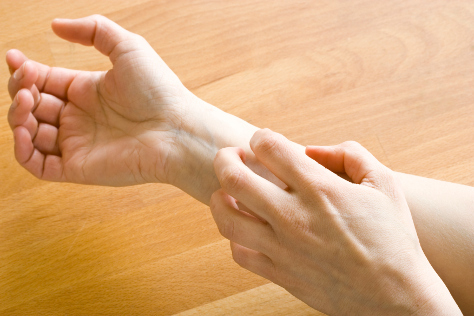ICP in pregnancy
Also known as Obstetric Cholestasis, ICP (Intrahepatic Cholestasis of Pregnancy) can be the cause of itchy hands and feet, and other areas of the body during pregnancy

What is ICP (Intrahepatic Cholestasis of Pregnancy)/Obstetric Cholestasis?
ICP (Intrahepatic cholestasis of pregnancy) is a potentially serious liver disorder that can develop in pregnancy. When your liver is functioning normally, bile acids flow from your liver to your gut which helps you digest your food. If ICP develops, the bile acids don't flow from your liver to your gut and can build up elsewhere in the body instead.
What are the symptoms of ICP?
ICP usually occurs from around 28 weeks of pregnancy but in some cases can develop from as early as 7 weeks of pregnancy. The most common symptom of ICP is moderate to severe itching, and in many cases it is the only symptom reported by mums-to-be. The itching is not accompanied by a rash.
- Other less common symptoms could include:
- Nausea/lack of appetite
- Dark urine
- Pale poo
- Under rib pain (on your right side)
- Fatigue
- Jaundice
Where is the itching likely to be?
The most common places for itching tends to be on the hands and feet, but mums-to-be also can suffer with itching on their wrists, ankles, arms, legs, scalp, or all over. Other women complain of itching everywhere except their hands and feet. Typically itching is worse at night. It can range from mild to severe itching (but more severe itching does not mean you have a worse case of the disorder). If you have itching such as this tell your midwife or doctor without delay.
How is ICP diagnosed?
The first thing your midwife or doctor will want to do is to exclude any other reasons there could be for the itching such as allergies or existing conditions within your family history. Once these are ruled out, you will have a series of blood tests called liver function tests (LFTs) which checks your liver function and tests acid levels in your bile.
What treatment is available?
Your condition will be monitored by having regular liver function tests which could be as often as weekly.
Weekly bile acid measurements may also be taken as this helps doctors recommend when is best for your baby to be born. If your LFTs and bile acids are normal but the itching continues and is severe, you will still need the weekly/bi-weekly blood tests to keep an eye on them.
What harm could ICP be to my baby?
Because of the increased chance of premature birth and risk of still birth, most women with ICP will be induced at around 37-38 weeks. More research is needed to determine whether this is necessary in less severe cases of ICP.
What can I use too soothe the itching?
Aqueous cream with menthol, are safe to use in pregnancy and can provide quick relief from itching. There are prescribed creams and calamine lotion that your doctor may offer if the itching is severe such as ursodeoxycholic acid (UDCA), that help reduce bile acids and ease itching.
If I develop ICP, will I have it for life?
No. ICP usually goes once your baby is born.